Food for thoughts
March 23, 2022
Thesaurus : Doctrine
► Référence complète : A. Menais (dir.), Raison d'être, engagement et responsabilité, préf. B. Le Marie, postace O. Grégoire, EMS Éditions, 2022, 192 p.
____
► Présentation de l'ouvrage (faite par l'éditeur) : C’est une révolution calme, certes, mais une vraie révolution sociétale que la loi Pacte a engagée.
Au-delà du droit, c’est en effet un nouvel espace qui s’ouvre pour équilibrer les relations entre État, entreprises et individus ; un espace qui permet de construire au-delà du capitalisme à un moment où les effets de la pandémie mondiale ont créé, de facto, les conditions du changement.
Cet ouvrage collectif ne prétend pas résoudre l’apparent paradoxe entre attentes de changements profonds sur le long terme et envie d’immédiateté de résultats, mais bien de mettre en lumière les enjeux juridiques, humains et sociaux, en particulier la responsabilité de l’entreprise et de ses dirigeants, qu’emportent les nouvelles notions établies par la loi du 22 mai 2019.
Les témoignages des experts en ressources humaines, en théories des organisations, des investisseurs, des économistes et des dirigeants, contributeurs à cet ouvrage, permettent d’appréhender les défi s inédits dévoilés par la définition des raisons d’être et des missions pour l’entreprise. Ils livrent des regards différents et complémentaires sur la nouvelle finalité des entreprises et des institutions : leur raison d’être. Ce sont des pionniers engagés qui témoignent de leurs choix, du chemin qu’ils ont parcouru et parfois entamé bien avant que la loi n’existe, et des attentes nées de ce changement.
____
► Auteurs des contributions : Jean-Paul Agon, Jean-David Aurange, Ludovic Aventin, Jean-Paul Berthomé, Christophe Bonduelle, Franck Carnero, Sophie Chambon-Diallo, Yves Chapot, Hervé Coureil, Jean-Marc Daniel, Bruno Dondero, Emmanuelle Duez, Charlotte Duthoo, Geneviève Férone-Creuzet, Ashley Grice, Nicolas Guérin, Armand Hatchuel, Martin Hitzer, Augustin Jaclin, Emery Jacquillat, Sophie Javary, Eric Labaye, Kevin Levillain, Caroline de la Marnierre, Adeline Lescanne Gautier, Helle Liautaud, Didier Martin, Colin Mayer, Lynn Paine, Alissa Pelatan, Alexandre Perra, Fanny Picard, Floriane de Saint Pierre, Blanche Segrestin, Julie Serrier, Dominique Stucki, Thibault de Tersant, Mathias Vicherat et Frank Wismer
____
March 17, 2022
Thesaurus : Doctrine
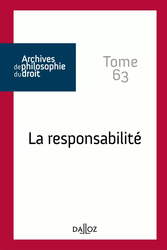
► Référence complète : Archives de Philosophie du Droit (APD), La responsabilité, t. 63, Dalloz, 2022, 505 p.
____
📗lire la 4ième de couverture de l'ouvrage
____
📗lire le sommaire de l'ouvrage
____
► Résumé de l'ouvrage : Les discussions autour de la réforme du droit de la responsabilité civile se poursuivent aujourd'hui dans et hors du Parlement depuis la proposition de loi sénatoriale de juillet 2021. Le tome 63 des Archives de philosophie du droit apporte sa contribution essentielle au débat sur la responsabilité, son rapport avec la liberté et son adaptation aux nouveaux enjeux de la société, tout en lui conservant son rôle de prévention, de régulation et de sanction.
Le volume comprend ainsi une trentaine de contributions de civilistes mais aussi de publicistes, d'historiens, de philosophes, comme celles des plus hauts Magistrats. Il constituera donc une référence incontournable pour la réflexion juridique actuelle comme pour celle des prochaines années.
____
Voir la présentation d'autres tomes des Archives de Philosophie du Droit.
________
Feb. 9, 2022
Teachings : Droit de la régulation bancaire et financière - semestre 2022

 ► Référence complète : Frison-Roche, M.-A., Prévention et sanction des Abus de Marchés, in Leçons de Droit de la Régulation bancaire et financière, Sciences po (Paris), 9 février 2022.
► Référence complète : Frison-Roche, M.-A., Prévention et sanction des Abus de Marchés, in Leçons de Droit de la Régulation bancaire et financière, Sciences po (Paris), 9 février 2022.
____
► Résumé de la leçon sur les Abus de marché : Dans une conception classique et du Droit et du "libre marché", le principe est la liberté d'action de la personne. Même si l'exercice de cette liberté, voire d'un droit subjectif peut causer un dommage, par exemple un dommage concurrentiel, c'est en quelque sorte le prix légitime d'une société libre et concurrentielle. Ainsi dans une conception libérale, seul l'abus est sanctionné, c'est-à-dire l'exercice fautif que l'on fait de sa liberté ou de son droit, allant parfois jusqu'à l'exigence d'une faute qualifiée.
Mais les secteurs bancaires et financiers ne sont pas gouvernés par le principe de libre concurrence. Ils sont gouvernés par le principe de régulation, le principe de concurrence n'y a qu'un rôle adjacent. Cela ne pourra qu'engendrer de graves difficultés lorsque le Droit de la concurrence et le Droit bancaire et financier font s'appliquer d'une façon cumulée ou confrontée sur une même situation.
Les marchés financiers sont construits sur le principe de régulation qui pose le principe de transparence et de partage d'une information exacte : c'est ainsi que l'intégrité des marchés financiers est assurée, l'Autorité des Marchés financiers en étant le gardien.
La prévention et la sanction des "abus" de marché est donc non pas une part résiduelle du Droit financier, mais un pilier de celui-ci, contrairement au Droit des marchés ordinaires concurrentiels, sur lesquels l'opacité et le non-partage des informations est la règle.
Cela explique l'état du droit des "abus de marché", dont l'effectivité de la prohibition est essentielle pour le bon fonctionnement ordinaire des marchés financiers. Leur prohibition nationale a été harmonisée par le Droit de l'Union européenne, à travers des textes dont les signes reprennent l'appellation anglaise : Market abuses (ainsi le nouveau Règlement communautaire sur les abus de marché est dit Règlement MAR (Market Abuses Regulation) et la directive qui l'accompagne MAD (Market Abuses Directive).
Il sanctionne un certain nombre de comportements, qui portent atteinte à l'intégrité des marchés,
Mais il n'exprime plus des exceptions par rapport à un principe : des fautes par rapport à des libertés ou à des droits. Il exprime des moyens par rapport à des principes dont la sanction des abus ne constitue que la concrétisation de principes dont ils sont la continuité même : l'efficacité du marché, son intégrité, sa transparence, l'information de l'investisseur.
C'est pourquoi la sanction des abus de marché ne sont pas du tout un phénomène périphérique par rapport à la Régulation des marchés financiers et à l'activité et au fonctionnement des bancaires, comme l'est le Droit pénal : elle est au contraire à la fois ordinaire et centrale. Cette différence des deux ordres publics va se retrouver dans la question lancinante de la sanction pénale et de la sanction administrative des mêmes abus de marché (par exemple "manquement d'initié" et "délit d'initié", qui ont tendance à se cumuler dans des techniques de répression qui seront l'objet de la prochaine leçon.
_____
🔎 Accéder aux slides servant de support à la leçon sur les abus de marché
🔎 Revenir aux bases avec le Dictionnaire bilingue du Droit de la Régulation et de la Compliance
🔎 Approfondir par la Bibliographie générale de Droit de la Régulation bancaire et financière
🔎 Revenir à la présentation générale du cours
🔎 Se reporter au plan général du cours
____
Utiliser les matériaux ci-dessous pour aller plus loin et pour préparer votre conférence de méthode ⤵️
Jan. 25, 2022
Thesaurus : Doctrine
► Référence complète : Jeanneney, J., Être citoyen, obéir aux lois, Jus Politicum, vol. 27, 2022, p. 143-171.
___
______

Jan. 19, 2022
Organization of scientific events

► Full Reference: Frison-Roche, M.-A., coordination and moderation of the conference L'office du juge et les causes systémiques (""The Office of the Judge and systemic causes"), in Cycle of Conferences, Penser l'office du juge ("Thinking the Office of the Judge"), Grand Chamber of the Cour de cassation, Paris, May 9, 2021, 17h-19h.
The conference is held in French.
____
► General presentation of the conference: the conference is based on the intervention of three judges, Christophe Soulard, Fabien Raynaud, and François Ancel, who think and debate among themselves on a hypothesis: the existence of "systemic causes". The hypothesis is that beyond and through the diversity of disputes and cases that are submitted to the most diverse judges, there is a category of cases that are systemic, which means containing in what is submitted to the judge for resolution a system. If such a category exists, which also raises the question of the diversity of systems and the difficulty arising from their submission to rules that are not legal (for example economic, biological, financial "laws", etc.) , then the judge should take this into account, both in the procedure and in the judgment they make on the case and in the way they formulate et restitute this judgment.
____
📝read the presentation of this conference by the Cour de cassation (in French)
📝read the program of the cycle of conferences 2022 (in French)
____
🎥see the conference video (in French)
🎥 see the synthesis video of the conference, made in situ by Marie-Anne Frison-Roche (in French)
____
✏️read the notes taken during the conference to make the synthesis (in French)
📝read the article of Marie-Anne Frison-Roche restituting this conference, published in the Recueil Dalloz (in French)
____
►read the works, basis of the two interventions of Marie-Anne Frison-Roche
🚧 L'hypothèse de la "cause systémique (made before the conference to prepare it), available en English
📝Synthese of the conference (made during the conference)
________

Dec. 24, 2021
Publications

🌐 follow Marie-Anne Frison-Roche on LinkedIn
🌐subscribe to the Newsletter MAFR Regulation, Compliance, Law
____
 ► Full reference: M.-A. Frison-Roche, Conceiving Power, Working Paper, December 2021
► Full reference: M.-A. Frison-Roche, Conceiving Power, Working Paper, December 2021
____
📝 This Working Paper serves as the basis for an article to be published in the collective book drawn up in tribute to Professor Emmanuel Gaillard.
____
► Working Paper summary: In 1985, Emmanuel Gaillard's central work came out under the title Le pouvoir en droit privé (The Power in Private Law)📎
Let's give full force to the original title of the thesis.
The deletion of the term notion perhaps implies that by defining something the essential is done, that there would be something of a pleonasm in aiming at The notion of Power and The Power, as Law likes to economise on words.
But it was indeed a renewed, simpler and more powerful conception of the notion of Power, containing the entire regime necessarily imputed, that this work imposed, henceforth illuminating positive Law. Emmanuel Gaillard's definition, on the other hand, goes beyond Private Law. We would gladly have argued in favour of retaining the heading for the term Notion, proposing instead to dispense with the reference to Private Law alone ....
Perhaps it was because the concept is so vast that in this seminal thesis its scope was restricted to Private Law, since the author already had to account for the sheer multiplicity of manifestations in this part of the legal system; Or perhaps it was because the concept of 'Power' is so familiar in Public Law that it would have needed less definition in Public Law (which, moreover, is so diversely proposed in this more political area, which is already careful on principle to distinguish between powers, which must always be plural in order to be separated), and that it was therefore reasonable to want to arrive at a single concept of Power in Private Law, where the notion of subjective rights is more familiar.
However, Emmanuel Gaillard's definition of Power as a prerogative placed, by legal rule or contract, in the hands of the person invested with them for the benefit, at least in part, of others, covers both Public and Private Law. This even contributes to the solidity of this thesis and explains why it flourishes today in legal systems where the distinction between Private Law and Public Law is weakening.
The power of this definition lies in its simplicity. Simple and brave minds are often the most fruitful. As Dean Gérard Cornu points out in his preface, the author, in particular because he bases himself more on positive law, for example that relating to the powers of corporate officers, does not get bogged down in discussions between authors only to end up preferring one over the other. He arrives at a definition that is close to our everyday experience: the one we experience when we collect an envelope on behalf of someone else and the agent asks us in what capacity we claim to be doing this on his behalf. We then show him our 'power', the legal power to do so for the benefit of the person to whom the letter is addressed, and can thus exercise the power to withdraw the letter, even though it is personal. When legal and common sense come together, it is a good omen, not only in terms of form, because everyone can understand it and the Law must remain comprehensible, but also in terms of substance, because everyone must be able to control the exercise of a power that is exercised for and over others. For this letter addressed to someone else, the person who has been able to take it by virtue of the power conferred on him/her, could just as easily open it and read it, then destroy it or give it to the worst enemy of the person to whom it was addressed. In Power, there is always might to do, and the danger to others that Power contains therefore.
This highly legal definition of Power not only distances the holder from his/her own interests, but also channels the Power thus granted to the person who benefits from it. In this respect, Emmanuel Gaillard not only distinguished between Power and subjective right, but also identified the right amount of power required for this power to effectively fulfill this 'Mission', through the notion of abuse of power, when the holder uses for other beneficiaries this power that was conferred on him/her for this sole purpose.
What is more, this concept makes it possible to distinguish Power from discretionary force, because the holder of Power thereby exercises factual , by acting for others, deciding for others, deciding on others. Because Power is inseparable from might, but might must remain the means of power and no more, the Law shall produce the antibodies that are not only the theory of abuse of power but also an Ex Ante responsibility that accounts must always be rendered, either to the other for whom everything is done or to a third party. For this third party is often there from the outset, the guardianship judge for example: because the Power was put in place because of the beneficiary's weakness, both in himself/herself and because of the situation, an impartial and disinterested third party is needed to ensure proper execution from the outset, without there even being a dispute. In this respect, how useful this thesis is for thinking about what Supervision is today!
This thesis, so clear, so simple and so strong, goes beyond Private or Civil Law. It is both much more restrictive than the more factual and political definition of Oower, which would be the ability to do something, and much broader than the usual definitions, since it embraces and legitimises de jure all situations where a person acts legally for the benefit of another. Dean Cornu shows, moreover, in two sentences that such a notion of power also captures the office of the judge, who has power over others only to serve them 📎
Moreover, Power thus contains its own limit in its very definition, since others are present in it: the holder has power only to serve others. From then on, it is only a power because it is a kind of Charge. Emmanuel Gaillard immediately uses the term: "Un individu se voit confier une charge qu'il exerce dans un intérêt au moins partiellement distinct du sien propre" ("An individual is entrusted with an office which he exercises in an interest at least partially distinct from his own") 📎
This definition offered by Emmanuel Gaillard in 1981, anchored in Private Law only insofar as it is the entire legal system, is premonitory of the Regulatory and Compliance Law as it unfolds today. It would be enough to continue the Gaillard's sentences, as if they had been half-written, to finish them 40 years later and find in them the mechanisms of Supervision of companies by public authorities which are now in place not to reduce their power but to ensure that they exercise it for the benefit of others 📎
The definition of Power thus conceived contains within itself its regime and enables us to anticipate it better today: because the holder exercises Power only for others, at least partially, he is consubstantially accountable for it, responsibility being only one form of this accountability; because this service must be effective and others must benefit fully from it, because unlike the subjective right which allows the holder freely not to use his might, Power has never been the 'most absolute' availability to use his/her might: it is even the opposite. It is the expression of a Power assigned to a purpose, compelling the holder to use his/her Power to that end. But it is equally necessary for the holder to have all the might to do so, otherwise the very notion of 'Power' is meaningless. This is the definition that should be given to the principle of Proportionality: the person on whom the Power rests must have not more power than is necessary, but all the power necessary to achieve the Monumental Goals for which the Power has been entrusted to him/her, so that others may derive full benefit from it (II).
In today's positive Law, the definition of Power as a Duty is found not only in Private Law but also in Public Law, not least because pure might, i.e. those that do not account for the use of their might, are in decline while concern for others is on the increase. The days of discretionary powers are over, and the increased independence of those who exercise Power over others requires them to be accountable. Beyond this Accountability, the personal Responsibility of those who have the Power to serve others is being established. But, no doubt because the Law is slow to evolve, the correlative idea that the holder of Power must have all the powers required to carry out his/her mission is less entrenched: As Emmanuel Gaillard has shown, the Law has only gone part of the way in sanctioning excesses of power, when the holder uses his/her power for other goals, but it has not yet clearly established that the holder - sometimes forced - of a Power is legitimate in using all the means required to achieve the result for which this Power, i.e. a charge and a duty, has been conferred on him/her.
No doubt we need to read Emmanuel Gaillard's thesis again in all its potential, to imagine the reading we could do today of what he could have written as if on blank pages that would write themselves, a magical thesis where everything is already there, a thesis so short (250 pages) and so beautiful, so dense that it already contains the Law of the Future. The Law of the Future 📎
____
Lire les développement ci-dessous⤵
Gaillard, E., Le pouvoir en droit privé, préf. Cornu. G., coll. ..., Economica, 1985.
Gaillard, E., La notion de pouvoir en droit privé, thèse .... ;
"En droit processuel, l'office du juge aurait donné à l'auteur un renfort. Pour le juge, il n'est point de pouvoir sans devoir. Au-delà de la distinction de ce qu'il a obligation de faire ou faculté d'apprécier, il y a toujours, au creux de ce qu'il peut, le sceau de ce qu'il doit, un devoir gardien - comme un âme - de l'exercice du pouvoir." (p.5).
n°3, p.9.
🕴️J. Carbonnier, 📗Essai sur les lois, 1992 (on the guardianship).
S. in a general way, 🕴️M.-A. Frison-Roche (ed.), 📕Régulation, Supervision, Compliance, 2017.
Cornu, préface précitée : "Tous les pouvoirs sont, à double face, des pouvoirs-devoirs" (p.5).
On Compliance Law as a Law of the Future, s. 🕴️M.-A. Frison-Roche, 📝Compliance Monumental Goals, beating heart of Compliance Law, in 🕴️M.-A. Frison-Roche (ed.), 📘Compliance Monumental Goals, 2023.
On the consequences for Liability Law, which is now looking to the Future, s. 🕴️M.-A. Frison-Roche, 🚧Ex Ante Responsibility, 2021.
Sur la notion de "Responsabilité Ex Ante", v. Frison-Roche, M.-A., La responsabilité Ex Ante", in Archives de Philosophie du Droit, La responsabilité, 2022.
Dec. 15, 2021
Thesaurus : Doctrine

► Référence complète : F. Zenati-Castaing, Le savoir des lois. Essai sur le droit romaniste, Dalloz, coll. "Méthodes du droit", 2021, 210 p.
____
____
📝Voir en particulier le Chapitre 2 de l'ouvrage, consacré à "La naissance de la science du droit" (pp.19-47)
____
► Résumé de l'ouvrage (fait par l'éditeur) : "Fruit de vingt ans de travaux, la thèse qui est soutenue dans cet essai est que la science du droit a pour origine l'instauration du règne de la loi, bouleversement historique des sources du droit qui a provoqué l'apparition d'un savoir théorique consacré exclusivement à la connaissance de cette source. Cette mutation fondamentale, dont est issue l'interprétation, est d'origine religieuse. Elle est liée au fait que les religions révélées ont fait de leurs textes sacrés la source exclusive du droit, ce qui a rendu nécessaire leur élucidation, juridique autant que théologique. La science du droit est née du besoin d'interpréter ces textes en vue d'en révéler la rationalité juridique aux croyants par l'enseignement, et de mettre au jour le droit qui leur est commun au-delà de la diversité des coutumes. Du fait de son caractère commun, elle tend à absorber toutes les autres sources du droit et à devenir hégémonique, provoquant l'apparition d'une forme originale de système juridique, dans lequel le droit se construit et se développe en dehors de la pratique sous la forme d'un savoir abstrait, le savoir de la loi. En Occident, ce système est incarné par le droit romaniste, un droit théorique fondé sur la loi, né dans les universités de la chrétienté médiévale. Il se distingue de la généralité des traditions juridiques par une source caractéristique, la science du droit, et se démarque des autres systèmes juridiques doctrinaux par la sécularisation de cette source et le caractère législatif de sa codification. L'étatisation du droit qu'a connue, à l'époque moderne, ce système juridique a mis en danger la science du droit en lui faisant perdre son caractère commun et en lui imposant la rivalité décisive de l'État législateur. Dépossédée de son hégémonie et de son pouvoir d'interprétation, celle-ci s'est efforcée de s'adapter à un ordre des sources qui lui est étranger. L'influence qu'elle exerçait sur le droit a décliné, provoquant un retour progressif du droit coutumier antérieur à la naissance du droit romaniste. En contrepoint de ce mouvement, resurgit aujourd'hui, de manière inattendue, la forme qu'elle avait au Moyen Âge, celle d'un droit commun à plusieurs peuples. ".
________
Nov. 2, 2021
Thesaurus : Jurisprudence
Oct. 3, 2021
Thesaurus
Référence complète : Morabito, M. et Defontaine, G., "Qu'est-ce qu'une révolution juridique ? Les enseignements de la Révolution française", Les Cahiers Portalis, vol.8, n°1, 2021, p.29-44.
____
Sept. 29, 2021
Thesaurus : Doctrine

► Référence complète : Défendre les libertés publiques. Mélanges en l'honneur de Patrick Wachsmann, Dalloz, 2021, 800 p.
____
📗lire le sommaire de l'ouvrage
____
📗lire la 4ième de couverture de l'ouvrage
____
► Résumé de l'ouvrage (fait par l'éditeur) : "Par ses enseignements, le professeur Patrick Wachsmann a profondément marqué, à Nancy et surtout à Strasbourg, des générations d'étudiants, mais il a aussi par ses nombreux écrits acquis une réputation nationale et internationale en offrant à ses lecteurs des idées, des manières de voir nouvelles et une sensibilité critique alliant rigueur et finesse d'analyse. Afin de lui rendre hommage pour la contribution exceptionnelle qu'il a apportée à la doctrine publiciste française et à la promotion des libertés publiques, ce volume de Mélanges a pour thème « Défendre les libertés publiques ». Le manuel que Patrick Wachsmann publie aux Éditions Dalloz est encore l'un des rares à utiliser l'appellation de « libertés publiques », expression à laquelle il tient beaucoup, ne serait-ce que pour dénoncer les insuffisances persistantes du système français de protection des libertés. Les contributions ici réunies émanent de ses collègues, anciens élèves et amis. Par-delà l'hommage rendu à un auteur, un professeur et un maître, elles témoignent de l'actualité d'une oeuvre qui, à la croisée des droits européens et du droit interne, tant dans ses dimensions historiques, théoriques que de droit positif, rappelle à tous les juristes la constante vigilance que réclame, contre les maux de notre temps, la défense des libertés.".
________
Updated: Sept. 18, 2021 (Initial publication: Sept. 10, 1999)
Publications
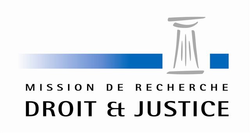
► Référence complète : Frison-Roche, M.-A., Droit, finance, autorité. Sociologie comparée des autorités de marchés financiers, recherches menées puis rapport rédigé pour le Laboratoire de sociologie juridique, Université Panthéon-Assas (Paris II), remis au GIP Mission de recherche Droit et justice, septembre 1999, dactyl., 117 p.
____
📝 Lire la table des matières de l'ouvrage.
____
📝 Lire le résumé et la synthèse de l'ouvrage en 4 pages.
____
📝 Lire le rapport
____
►Lire les deux monographies accompagnant le rapport :
📝 Bouthinon-Dumas, H., Le rôle des autorités de marchés financiers dans la crise asiatique vue à travers la presse
📝 V. Magnier, Les autorités de marchés financiers aux Etats-Unis. Droit, juge et autorité de marché
____
📝 Lire les synthèses concernant les différents pays étudiés
📝 Lire la grille d'entretien semi-ouvert
________
Sept. 16, 2021
Conferences
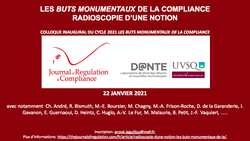
 Full reference: Frison-Roche, M.-A., Rapport de synthèse (Conclusion) in André C., Frison-Roche, M.-A., Malaurie, M. and Petit, B., Les Buts monumentaux de la Compliance (Compliance Monumental Goals), Colloquium co-organised by the Journal of Regulation & Compliance (JoRC) and the Laboratoire Dante of Paris-Saclay University,
Full reference: Frison-Roche, M.-A., Rapport de synthèse (Conclusion) in André C., Frison-Roche, M.-A., Malaurie, M. and Petit, B., Les Buts monumentaux de la Compliance (Compliance Monumental Goals), Colloquium co-organised by the Journal of Regulation & Compliance (JoRC) and the Laboratoire Dante of Paris-Saclay University,
____
📅 September 16, 2021.
🧭 Maison du Barreau, 12 place Dauphine 75004 Paris
____
► Conclusions' Summary: Based on the multiple contributions of the day, the first part of this synthesis focuses on the practical interest of having Monumental Goals attached to compliance techniques.Conceptually defining these Monumental Goals as normative legal rules of Compliance Law has the first practical advantage of making clear this scattered and almost incomprehensible material, allowing us to better understand it. The second practical advantage is to bring together the various branches of law in that they all contain compliance mechanisms, the points of contact thus discerned leading to a unification of technical legal rules. The third practical advantage is to provide the various sources of law concerned with a means of applying and interpreting the law. The fourth practical advantage is to give meaning to all these technical provisions.
In the second part of this synthesis, it appeared that these practical considerations therefore justify undertaking the "conceptual adventure". This one can take three pillars, in this "cathedral" that Dominique de la Garanderie designed, this "monument" corresponding well to the adjective Monumental which is better suited to these Goals than does the adjective "Fundamental", because it is a question of building, of building for a future which is not fatal. The first conceptual pillar consists in conceptualizing the Monumental Goals so that the Compliance Law finding a substantial meaning thus gives in a normative way a meaning to all the technical provisions which serve it in an instrumental way. The second conceptual pillar consists of giving everyone their place, that of public authority, that of the company and that of the population, each concerned and each not having to take the place of the other in the determination of the monumental goals, the company being in particular free in the design of the means while the political authority being in charge of drawing the Goals, the company being able to copy them on its own account. This conception does not depend on legal systems but on goals and legitimacy, in particular on the definition chosen for what is a company. The third conceptual pillar derives precisely from the humanist conception that one can claim to have of the Compliance Monumental Goal, risk management being only a means to achieve it. Humanism effectively carried by Compliance, taken on their own account by the companies alone capable of making them concrete, is what makes it possible to distinguish texts that are nevertheless technically similar, depending on whether they apply in Rule of Law systems or in systems which are note governed by the Rule of Law Principle.
This is why the technical future of Compliance Law lies in this conceptual adventure that it is necessary to lead.
_________
📝 read the program of this colloquium
🎥 see Marie-Anne Frison-Roche's conclusion in video (in French, with English subtitles)
✏️ read the notes translated in English on which this conclusion is based
_______
📅 This colloquium is part of the Cycle of colloquium 2021 organized by the Journal of Regulation & Compliance (JoRC) and its partners around Compliance Monumental Goals.
📘 This manifestation is in French but the interventions will be part of an English collective book directed by Marie-Anne Frison-Roche, Compliance Monumental Goals, co-edited by the JoRC and Bruylant.
📕 An equivalent book in French, Les Buts Monumentaux de la Compliance, directed by Marie-Anne Frison-Roche, will be co-published by the JoRC and Dalloz.
Sept. 15, 2021
Thesaurus : Doctrine
Référence complète : Ost, F., Le Petit Prince au pays du Covid, Les cahiers de la justice, 2021, p.535 et s.,
_____

Sept. 15, 2021
Publications

 ► Full Reference: M.-A. Frison-Roche, Ex Ante Responsibility, Working Paper, December 2021.
► Full Reference: M.-A. Frison-Roche, Ex Ante Responsibility, Working Paper, December 2021.
____
📝This Working Paper has been the basis for an article written in French, "La responsabilité Ex Ante", published in the Archives de Philosophie du droit (APD), in the book 📗La Responsabilité (2022).
____
► Working Paper Summary: Quel est le temps auquel s'articule la responsabilité ? La question est si classique que toutes les réponses ont été dessinées : si l'on est responsable plus aisément par rapport au temps, car l'on peut alors plus aisément faire un lien entre la situation appréhendée, sa réalisation dans le passé la rendant plus facilement connaissable, et le poids de "responsabilité" que l'on impute sur une personne, l'on peut articuler la responsabilité avec le futur. Si l'on brise le poids de cette responsabilité avec un évènement ou une situation, par exemple. Le Principe Responsabilité de Jonas ou l'Ethique de la Responsabilité font ainsi voyager la Responsabilité dans le temps, par un rapport entre le Droit et l'Ethique.
D'ailleurs l'on pourrait soutenir que le Droit peut faire ce qu'il veut et imputer une responsabilité à quiconque pour le temps qu'il désigne, par exemple désigne comme porteur d'une responsabilité, c'est-à-dire d'un poids, celui qu'il veut. Le "responsable" serait alors le titulaire d'une sorte de "poids pur", qui le charge parce que le Droit l'a voulu pour le temps qu'il veut, par exemple un devoir d'agir pour que le futur soit dessiné comme le veut le Droit, alors même que le Responsable n'a rien à se reprocher dans le passé.
Mais les Cours constitutionnelle défendent un rapport minimal entre la Responsabilité et le poids que celle-ci fait porter une personne, fut-t-elle morale, gardant ainsi le lien consubstantiel entre le Droit et la Morale, la technique juridique de la Responsabilité ne pouvant équivaloir à celle d'un prélèvement obligatoire.
Ainsi l'idée d'une Responsabilité Ex Ante est simple dans son principe (I). Elle est celle d'un poids juridiquement posé sur une personne soit par elle-même (engagement), soit par la Loi ou par le Juge sur une personne de faire quelque chose pour que n'advienne pas quelque chose qui adviendrait ou pour qu'advienne quelque chose qui n'adviendrait pas si elle ne le faisait pas.
Mais les conditions juridiques pour admettre un tel poids alors même que le lien avec une situation passée serait brisé est plus difficile (II). On continue certes continuer à voir dans le futur le passé, ce qui facilite le voyage dans le temps, et fonda par exemple le contrôle Ex Ante du contrôle des concentrations. Mais l'on peut se briser même de cette facilité et regarder non plus le rapport entre le passé et le futur, mais le présent et le futur : ce que l'on sait déjà aujourd'hui du futur, ce qui met en jeu le rapport entre le Droit et la Science ; ce que l'on observe de l'emprise de la personne présente sur le moment présent, c'est-à-dire le Pouvoir, ce qui fait en jeu le rapport entre le Droit et l'Economie politique.
Dans cette dimension-là, la contrainte de la Responsabilité Ex Ante est alors maniée par le Juge, dont l'office lui-même devient un office Ex Ante. Les pouvoirs obligés Ex Ante par une telle responsabilité maniée par le Juge étaient les personnes en situation de pouvoir, sont non seulement les entreprises, mais encore les Etats, qui perdent le privilège - partagé avec les contractants - de disposer juridiquement du futur, et notamment en leur sein le Législateur.
Une telle révolution, qui se déroule sous nos yeux, s'explique parce qu'il faut agir maintenant pour que le futur ne soit pas catastrophique. La science nous informe qu'il le sera entéléchiquement. Il est donc juridiquement requis de désigner des responsables, non pas parce qu'ils auraient fait quelque chose, la dimension Ex Post n'étant pas le sujet, mais pour qu'ils fassent quelque chose, la Responsabilité Ex Ante étant un élément central de cette nouvelle branche du Droit qu'est le Droit de la Compliance.
Sept. 8, 2021
Thesaurus : Doctrine
► Référence complète : G. Davy, "Le mythe des lois de saint Óláf et l’invention des loisfondamentales dans la Norvège médiévale", Cahiers de civilisation médiévale 2021/3 n° 255, pp.197-210, Éditions Université de Poitiers.
____
🦉Cet article est accessible en texte intégrale pour les personnes qui suivent les enseignements du professeure Marie-Anne Frison-Roche.
________

Aug. 25, 2021
Publications


🌐follow Marie-Anne Frison-Roche on LinkedIn
🌐subscribe to the Newsletter MAFR Regulation, Compliance, Law
____
► Full Reference: M.-A. Frison-Roche, M.-A., Monumental Goals, beating heart of Compliance Law, Working Paper, August 2021
____
📝This Working Paper is the basis for the article, "Les buts monumentaux, cœur battant du droit de la compliance", constituting the introduction ⤵
📕in its French version, of the book Les buts monumentaux de la Compliance, in the Series 📚Régulations & Compliance
📘in its English version, of the book, Compliance Monumental Goals, in the Series 📚Compliance & Regulation
____
► Summary of the Working Paper:
Compliance Law can be defined as the set of processes requiring companies to show that they comply with all the regulations that apply to them. It is also possible to define this branch of Law by a normative heart: the "Monumental Goals". These explain the technical new legal solutions, thus made them clearer, accessible and anticipable. This definition is also based on a bet, that of caring for others that human beings can have in common, a universality.
Through the Monumental Goals, appears a definition of Compliance Law that is new, original, and specific. This new term "Compliance", even in non-English vocabulary, in fact designates a new ambition: that a systemic catastrophe shall not be repeated in the future. This Monumental Goal was designed by History, which gives it a different dimension in the United States and in Europe. But the heart is common in the West, because it is always about detecting and preventing what could produce a future systemic catastrophe, which falls under "negative monumental goals", even to act so that the future is positively different ("positive monumental goals"), the whole being articulated in the notion of "concern for others", the Monumental Goals thus unifying Compliance Law.
In this, they reveal and reinforce the always systemic nature of Compliance Law, as management of systemic risks and extension of Regulation Law, outside of any sector, which makes solutions available for non-sector spaces, in particular digital space. Because wanting to prevent the future (preventing evil from happening; making good happen) is by nature political, Compliance Law by nature concretizes ambitions of a political nature, in particular in its positive monumental goals, notably effective equality between human beings, including geographically distant or future human beings.
The practical consequences of this definition of Compliance Law by Monumental Goals are immense. A contrario, this makes it possible to avoid the excesses of a "conformity law" aimed at the effectiveness of all applicable regulations, a very dangerous perspective. This makes it possible to select effective Compliance Tools with regard to these goals, to grasp the spirit of the material without being locked into its flow of letters. This leads to not dissociating the power required of companies and the permanent supervision that the public authorities must exercise over them.
We can therefore expect a lot from such a definition of Compliance Law by its Monumental Goals. It engenders an alliance between the Political Power, legitimate to enact the Monumental Goals, and the crucial operators, in a position to concretize them and appointed because they are able to do so. It makes it possible to find global legal solutions for global systemic difficulties that are a priori insurmountable, particularly in climate matters and for the effective protection of people in the now digital world in which we live. It expresses values that can unite human beings.
In this, Compliance Law built on Monumental Goals is also a bet. Even if the requirement of "conformity" is articulated with this present conception of what Compliance Law is, this conception based on Monumental Law is based on the human ability to be free, while conformity law supposes more the human ability to obey.
Therefore Compliance Law, defined by the Monumental Goals, is essential for our future, while conformity law is not.
________
Read the developments below⤵️
June 23, 2021
Conferences
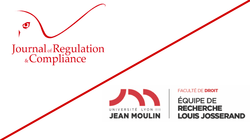
 Full reference: Frison-Roche, M.-A., The judge-judged: Articulate words and things face to the difficult conflicts of interest, in L'entreprise instituée Procureur et Juge d'elle-même par le Droit de la Compliance, colloquium co-organized by the Journal of Regulation & Compliance (JoRC) and Lyon 3 Law School, 23rd of June 2021.
Full reference: Frison-Roche, M.-A., The judge-judged: Articulate words and things face to the difficult conflicts of interest, in L'entreprise instituée Procureur et Juge d'elle-même par le Droit de la Compliance, colloquium co-organized by the Journal of Regulation & Compliance (JoRC) and Lyon 3 Law School, 23rd of June 2021.
____
This conference was in French ; the Working Paper on which this conference was based is in French and in English: The judge-judged: Articulate words and things face to the stressful conflicts of interest
📅 June 23, 2021, 9h30 - 18h30
🧭 Lyon, Lyon 3 Law School, "Salle de la Rotonde" and online
____
📊 Read the slides on which this conference is based (in French)
🎥 See the video of this conference.
📝 Read the general program of this colloquium (in French)
📝 Read the working paper on which this conference is based (in English)
___
📅 This colloquium is part of the cycle of colloquia in 2021 organized by the Journal of Regulation & Compliance (JoRC) and its partners about Compliance Juridictionnalization.
📕 📘 The conference is the first basis for the writing of an article, forthcoming in a book whose the French version is La juridictionnalisation de la Compliance, co-published by the Journal of Regulation & Compliance (JoRC and Dalloz, and whose the English version Compliance Juridictionnalisation, is co-published by the Journal of Regulation & Compliance (JoRC) and Bruylant.

____
🔻 Summary of the conference: read below.
June 15, 2021
Thesaurus : 05. CJCE - CJUE
Full reference: CJEU, Grand chamber, Judgment Facebook Ireland e.a. v. Gegevensbeschermingsautoriteit, C-645-19, June 15, 2021
Read the abstract of the judgment done by the Court
June 2, 2021
Thesaurus : Doctrine
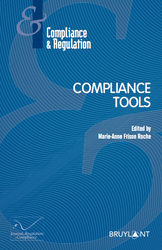
Full reference : Galland, M., The Regulator's Inspection of the Effectiveness of the Compliance Tools Implemented by the Company, in Frison-Roche, M.-A. (ed.), Compliance Tools, serie "Régulations & Compliance", Journal of Regulation & Compliance and Bruylant, 2021, p. 211-224.
Read a general presentation of the book in which the article has been published.
___
Summary of the article (done by Marie-Anne Frison-Roche)
The author underlines the complexity of the measure of the effectivity of compliance tools because the measure of the risks cannot be mechanical, the exercise is a cost whose the advantage does not appear immediately, the essential is in the behaviors that the firm masters with difficulty while these are results that are evaluated, because Compliance tools must be effective and produce tangible results.
To do that, the regulator intervenes in Ex Ante in order to the applicable texts are understandable by the firm and in order to the tool is working. When a noncompliance occurs, the regulator must beyond the sanction build on this measure of ineffectiveness to lead operators to improve their systems. Thus, it is in terms of "Compliance effort" that the regulator's control works, especially through the observation of an "embodied exemplarity".
Read the summaries of the other articles of the book.
____
April 21, 2021
Publications

Full reference : Frison-Roche, M.-A., Questionnaire de Proust (Proust's Quiz), in Droit & Littérature, n°5, p.37-38, Lextenso, 2021.
The chosen topic for this volume is Proust.
Read (in French)
See its presentation on LinkedIn (in French)
March 31, 2021
Conferences

 Full reference: Frison-Roche, M.-A., Compliance et arbitrage. Rapport de synthèse: un adossement (Compliance and Arbitration: a Backing. Conclusion), in Frison-Roche, M.-A. & Racine, J.-B., Compliance et Arbitrage (Compliance and Arbitration), Colloquium co-organised by the Journal of Regulation & Compliance (JoRC) and the Centre de recherches sur la Justice et le Règlement des Conflits (CRJ) of Panthéon-Assas University (Paris II), with the support avec the International Court of Arbitration, Paris, 31st of March 2021
Full reference: Frison-Roche, M.-A., Compliance et arbitrage. Rapport de synthèse: un adossement (Compliance and Arbitration: a Backing. Conclusion), in Frison-Roche, M.-A. & Racine, J.-B., Compliance et Arbitrage (Compliance and Arbitration), Colloquium co-organised by the Journal of Regulation & Compliance (JoRC) and the Centre de recherches sur la Justice et le Règlement des Conflits (CRJ) of Panthéon-Assas University (Paris II), with the support avec the International Court of Arbitration, Paris, 31st of March 2021
_____
Read the program of this colloquium
See Marie-Anne Frison-Roche's conclusion in video (in French, with English subtitles)
These notes of the conclusion have been written as the colloquium took place.
See the video of the entire colloquium (in French, with English subtitles)
___
This colloquium is part of the Cycle of colloquium 2021 organized by the Journal of Regulation & Compliance (JoRC) and its partners around the topic Compliance Juridictionnalization.
This manifestation is in French but the interventions will be the basis for a specific chapter of the English collective book directed by Marie-Anne Frison-Roche, Compliance Juridictionnalization, co-published by the JoRC and Bruylant.
An equivalent book in French, La Juridictionnalisation de la Compliance, directed by Marie-Anne Frison-Roche, will be co-published by the JoRC and Dalloz.
Read the notes established for the conclusion below ⤵️
March 18, 2021
Thesaurus : Doctrine
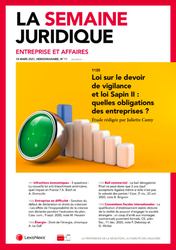
March 3, 2021
Teachings : Banking and Financial Regulatory Law - Semester 2021

Résumé de la leçon. Dans son lien avec la gouvernance, le Droit de la régulation bancaire et financière a l'ambition d'organiser la façon dont les pouvoirs s'organisent au sein des entreprises, son prisme le conduisant à orienter cette gouvernance vers la protection de l'épargne, des investisseurs et des marchés. Imprégnant ainsi le Droit des sociétés, c'est contre cela que le rapport Notat-Senard a réagi, puis ce que la loi dite PACTE du 22 mai 2019 a cristallisé.
Il demeure que si la société est cotée, ce qui ne correspond pas à toutes les entreprises, le Droit de la régulation continue à influer cette gouvernance à travers le principe de transparence. Celui-ci accroit son emprise lorsqu'il y a une perspective de changement de contrôle. En effet les marchés financiers ne sont pas que des marchés de rendements pécuniaires : ils sont aussi des marchés de pouvoirs, ce qui renvoie à la double nature du titre de capital : son titulaire peut revendiquer des droits patrimoniaux (potentiels) mais aussi des droits politiques actifs, même s'ils n'emportent pas forcément pouvoir de décision.
Ce marché du pouvoir et du contrôle des sociétés est par excellence le marché boursier. Les prises de contrôle, qui pourraient en rester à la nature de contrats d'achat et de vente, sont entièrement gouvernées par l'Autorité de Régulation. L'on part donc du principe d'une offre, mais il peut arriver que cette offre d'achat (ou d'échange) devienne "obligatoire", lorsque des seuils de prise de contrôle sont déjà atteints. Même lorsque des textes interviennent dans un sens libéral, comme en ce qui concerne le contrôle des montants proposés par les offreurs dans le mécanismes d'OPA ou d'OPE les directives de l'Union européennes demandant à ce que les Régulateurs ne contrôlent plus le caractère "équitable" de celui-ci, les juges admettent que par le visa de l'office général du Régulateur et la bonne information de l'actionnaire un tel contrôle soit maintenu, voire accru (cas Altice).
Le marché financier pénètre déjà dans cette régulation des pouvoirs sociétaires lorsque la société est "exposée" au marché financier par la cotation de ses titres sociaux, ou par le mécanisme plus général de financement de marché, les investisseurs titulaires de titres de créance demandant le bénéfice de la même transparence, voire des droits politiques analogues à ceux dont bénéficient les titulaires des titres de capital. Mais les entreprises, à travers leur structuration sociétaire, sont définitivement "ouvertes" lorsque leur capital, c'est-à-dire non seulement leur richesse mais encore le pouvoir politique, est disponible sur ce marché financier spécifique qu'est le marché boursier. Le Droit régule alors les procédés de "prise de contrôle", tâche première de l'Autorité des marchés financiers, car si le pouvoir est par principe disponible, la "loi des volontés" ne peut suffire. L'on retrouve alors, mais sous une forme plus nette, les lois du capital, des volontés et des intentions.
Le Droit pose en effet le principe même des "offres publiques", les opérateurs devant tout d'abord révéler leur "intention" de prendre le contrôle, puis devant offrir à tout actionnaire une contrepartie soit en argent soit en titres. Dans cet achat du pouvoir, le Régulateur boursier joue un rôle central, mais les textes européens dans une perspective plus libérale que précédemment ont posé qu'il n'a pas à contrôler le caractère équitable du prix que l'initiative de l'offre propose, concentrant davantage son pouvoir sur l'information due aux personnes "intéressées", ce qui est excède le seul cercle des titulaires des titres de capital, pour concerner le cercle de la catégorie qui commence à s'implanter dans le nouveau Droit des sociétés qui se dessine : les "parties prenantes". Par la régulation des "prises de contrôle des sociétés ouvertes", l'on quitte de plus en plus l'idée d'une Régulation jouxtant l'économie administrée, parce qu'il s'agirait de la puissance étatique tenant les structures du marché financier afin que celui-ci soit fiable, le premier principe étant la transparence, pour aller vers une Régulation jouxtant la "Gouvernance" des sociétés qui sont exposées aux marchés financiers et qui à ce titre doivent admettre que leur fonctionnement politique doit être transparent, notamment au regard du futur de l'entreprise, voire partagé avec ceux qui ont un intérêt financier avec ce fonctionnement, voire avec également ceux qui y ont un intérêt non directement financier. En cela, le Droit de la Régulation des marchés financiers, en procéduralisant et en contrariant le fonctionnement trop brutal de ceux-ci, est le bastion avancé d'un fonctionnement plus général des sociétés, de nombreuses dispositions ayant tendance à être bilatéralisées dans le Droit des sociétés non-cotées, puisque cette distinction n'existe pas formellement par ailleurs dans le Droit des sociétés.
Revenir aux bases avec le Dictionnaire bilingue du Droit de la Régulation et de la Compliance
Revenir au plan général du cours de Droit de la Régulation bancaire et financière
Revenir à la présentation générale du cours de Droit de la Régulation bancaire et financière
Utiliser les matériaux ci-dessous pour aller plus loin et préparer votre conférence de méthode.
March 2, 2021
Thesaurus : 08. Juridictions du fond
Full reference: Tribunal administratif de Paris (Paris administrative court), 4th section, 1st Chamber, Oxfam France, Notre Affaire à tous, Fondation pour la Nature et l’Homme et Greenpeace France, 3rd of February 2021, n°1904967, 1904968, 1904972, 1904976/4-1
Read the press release from Tribunal administratif de Paris (in French)
Feb. 24, 2021
Thesaurus : Jurisprudence
Full reference: Autorité de Contrôle Prudentiel et de Résolution (French Banking Regulator), Commission des sanctions (Commission of sanctions), 24th of February 2021, ING Bank France, procedure n°2020-02
Read the decision (in French)
In this decision, the ACPR Sanctions Commission condemns IGN Bank France to a reprimand and a financial penalty of 3 million euros because of the inadequacy of its measures to fight corruption, money laundering and financing of terrorism.
Extract from the decision summarizing ING France's breaches of its Compliance obligations to fight against corruption, money laundering and financing of terrorism:
"At the time of the on-site check, ING France's risk classification was incomplete and ineffective (grievance 1) and its system for monitoring its business relations (complaint 2) and their operations (grievance 4) presented serious deficiencies, as well as its organization and procedures for fund transfers (grievance 3). The updating of customer knowledge was insufficient (grievance 5), as were the detection of PEPs and the implementation of measures due diligence for this category of clientele (grievance 6). For the implementation of its due diligence obligations, numerous shortcomings were noted, whether these were breaches of the obligation to carry out a reinforced examination (grievance 7) or breaches of the obligation to send Tracfin a DS, initial (grievance 8) or additional (grievance 9). Finally, the detection of persons subject to an asset freezing measure was not fully effective (grievance 10) " (our translation of the decision which is only available in French).